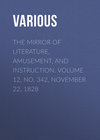Read the book: «The Mirror of Literature, Amusement, and Instruction. Volume 12, No. 342, November 22, 1828», page 4
LINES TO EDWARD LYTTON BULWER, ON THE BIRTH OF HIS CHILD
My heart is with you, Bulwer, and portrays
The blessings of your first paternal days;
To clasp the pledge of purest, holiest faith,
To taste one's own and love-born infant's breath,
I know, nor would for worlds forget the bliss.
I've felt that to a father's heart that kiss,
As o'er its little lips you smile and cling,
Has fragrance which Arabia could not bring.
Such are the joys, ill mock'd in ribald song,
In thought, ev'n fresh'ning life our life-time long,
That give our souls on earth a heaven-drawn bloom;
Without them we are weeds upon a tomb.
Joy be to thee, and her whose lot with thine,
Propitious stars saw Truth and Passion twine!
Joy be to her who in your rising name
Feels Love's bower brighten'd by the beams of Fame!
I lack'd a father's claim to her—but knew
Regard for her young years so pure and true,
That, when she at the altar stood your bride,
A sire could scarce have felt more sire-like pride.
T. Campbell.
The Duc de Laval has the character of being a perfect fool. It is said that on one occasion he talked of having received an anonymous letter, signed by all the officers of his regiment; that on another, he ordered ottomans to be placed in the four corners of his octagon saloon!—Josephine's Memoirs.
CAUSE AND EFFECT
Infinite are the consequences which follow from a single, and often apparently a very insignificant circumstance. Paley himself narrowly escaped being a baker; here was a decision upon which hung in one scale, perhaps, the immortal interests of thousands, and, in the other, the gratification of the taste of the good people of Giggleswick for hot rolls. Cromwell was near being strangled in his cradle by a monkey; here was this wretched ape wielding in his paws the destinies of nations. Then, again, how different in their kind, as well as in their magnitude, are these consequences from anything that might have been à priori expected. Henry VIII. is smitten with the beauty of a girl of eighteen; and ere long,
"The Reformation beams from Bullen's eyes."
Charles Wesley refuses to go with his wealthy namesake to Ireland, and the inheritance, which would have been his, goes to build up the fortunes of a Wellesley instead of a Wesley; and to this decision of a schoolboy (as Mr. Southey observes) Methodism may owe its existence, and England its military—and, we trust we may now add, its civil and political—glory—Quarterly Rev.
SERVANTS
A fund has lately been established at Stockholm, from which it is intended to reward good and faithful servants. The king has contributed to it 1,000 crowns; the prince royal 500; and the princess royal 300. This has been suggested as an example worthy of our imitation; many legacies, &c. have from time to time been bequeathed for the encouragement of faithful servants in England; some are claimed, but the majority are shamefully misapplied by those to whom their distribution has been entrusted.
LONDON LUXURIES
A capital like London is a Maelstrom—an immense whirlpool—whose gyrations sweep in whatever is peculiarly desirable from the most distant regions of the empire—so active becomes the love of gain when set in motion by the love of luxury. We recollect once being on shipboard to the north of Duncan's Bay Head, and out of sight of land, the nearest being the Feroe Islands:—we were walking the deck, watching a whale which was gamboling at some distance, throwing up his huge side to the sun, and sending ever and anon a sheet of water and foam from his nostrils. Our thoughts were on Hecla and on the icebergs of the Pole, on the Scalds of Iceland and the sea-kings of Norway, when a sail hove in sight: we asked what craft it was—and were answered, "a Gravesend brig dredging for lobsters." Never was enchantment so effectually broken—never stage-trick in pantomime more successfully played off. Scene changes from Feroe and Iceland to the Albion in Aldersgate-street—Exeunt Scald, champion, and whale—Enter common councilman, turbot, and lobster-sauce.—Quarterly Rev.
THE BEAUTIFUL
To be convinced that, at some period or another of their history, the Egyptians had conceived a beau-ideal superior to the beautiful which nature habitually produced in their country, we have only to examine the young Memnon, at the British Museum, and the heads of many of the sphinxes which remain.—Weekly Rev.
ALGEBRA
Algebra I was charmed with, and found so much pleasure in resolving its questions, that I have often sat till morning at the engaging work, without a notion of its being day till I opened the shutters of my closet. I recommend this study in particular to young gentlemen, and am satisfied, if they would but take some pains at first to understand it, they would have so great a relish for its operations, as to prefer them many an evening to clamorous pleasures; or, at least, not be uneasy for being alone now and then, since their algebra was with them.—Life of John Buncle.
A LUCKY MATCH
The late Mr. Locke, of Norbury Park, commissioned one Jenkins, a dealer in pictures, residing at Rome, to send him any piece of sculpture which might not exceed fifty guineas. Jenkins sent a head of Minerva, which Mr. Locke, not liking, returned, paying the carriage, and all other expenses. Nollekens, who was then also at Rome, having purchased a trunk of Minerva for fifty pounds, upon the return of this head, found that its proportion and character accorded with his torso. This discovery induced him to accept an offer made by Jenkins of the head itself; and 220 guineas to share the profits. After Nollekens had joined the head and trunk, or, what is called "restored it," which he did at the expense of twenty guineas more for stone and labour, it proved a most fortunate hit, for they sold it for the enormous sum of 1,000 guineas! and it is now at Newby, in Yorkshire.—Nollekens and his Times.
NELSON
We received the following little anecdote from a letter of a gentleman now at the head of the medical profession, with which he favoured us shortly after perusing Salmonia. "I was (says our friend) at the Naval Hospital, at Yarmouth, on the morning when Nelson, after the battle of Copenhagen (having sent the wounded before him,) arrived at the Roads, and landed on the jutty. The populace soon surrounded him, and the military were drawn up in the market-place ready to receive him; but making his way through the crowd, and the dust, and the clamour, he went straight to the hospital. I went round the wards with him, and was much interested in observing his demeanour to the sailors; he stopped at every bed, and to every man he had something kind and cheering to say. At length, he stopped opposite a bed on which a sailor was lying who had lost his right arm close to the shoulder-joint, and the following short dialogue passed between, them:"—Nelson. "Well, Jack, what's the matter with you?"—Sailor. "Lost my right arm, your honour."—Nelson paused, looked down at his own empty sleeve, then at the sailor, and said playfully, "Well, Jack, then you and I are spoiled for fishermen—cheer up, my brave fellow." And he passed briskly on to the next bed; but these few words had a magical effect upon the poor fellow, for I saw his eyes sparkle with delight as Nelson turned away and pursued his course through the wards. As this was the only occasion on which I saw Nelson, I may, possibly, overrate the value of the incident.—Q. Rev.
THE BRITISH ALMANAC
This work, though only in its second year, is too well known to be benefited by our recommendation. As a compilation, with occasional originality, it is one of the best executed labours of the Society from whom it emanates, and who, from the multiplicity of facts here assembled, may be called "The Society for the" Condensation "of Useful Knowledge."
In the Almanac for 1829 we notice several improvements upon that of last year. The "Remarks on Weather" are valuable; and the "Garden Plants in Flower" in each month, in themselves extremely interesting, contrast the unchanging course of nature with the grand revolutions and events of the column of "Anniversaries." Thus, what different emotions are produced by reading April 6, "First Abdication of Bonaparte, 1814," and "Primrose Peerless (Narcissus biflorus) in flower." The "Useful Remarks," though not a new feature in an almanac, are profitable helps to social duties, especially when drawn from such a source as Owen Feltham's Resolves—a golden treasury of world-knowledge, which may serve as a text-book for every family. Among the useful facts we notice the following:—"By a parliamentary return of the year 1828 we find that the stamp duty paid upon the almanacs of England amounts to 30,136l. 3s. 9d.—which, the duty being fifteen-pence upon each almanac, exhibits a circulation of 451,593 annually."
Remarks on Weather
"The mean temperature of London is about 2° higher than that of the surrounding country; the difference exists chiefly in the night, and is greatest in winter and least in summer."
"Mr. Howard is of opinion, from a careful comparison of a long series of observations, that a wet spring is an indication of a dry time for the ensuing harvest."
"The greatest depression of temperature in every month happens, all other circumstances being the same, a short time before sun-rise."
"There are only two months, namely, July and August, in which, taking into consideration the power of radiation, vegetation, in certain situations, is not exposed to a temperature of 32°."
"The temperature of August is but little reduced, owing to the prevalence of hot nights. The action of the sun's rays is considerably assisted by the warm earth which radiates heat into the air; while, in spring, it absorbs every day a proportion of the heat which the sun produces."
"October—Now that the fruits of the earth are laid in store, the increase of wet is attended by no injurious effects, the remaining heat of the earth is preserved from needless expenditure, and guarded from dissipation, by an increasing canopy of clouds, by which the effect of radiation is greatly reduced."
"The comparative warmth of November is owing to the heat given out by the condensation of the vapour in the atmosphere into rain."
"The mean temperature of the whole year is not found to vary, in different years, more than four degrees and a half."
Such as hold superstition sweet to the soul, and love to exercise their ingenuity in hieroglyphics, the baseless grounds of tea, and lucky dreams and omens, will find little amusement in the British Almanac; but their absence is more than supplied by information "which almost every man engaged in the world requires."










